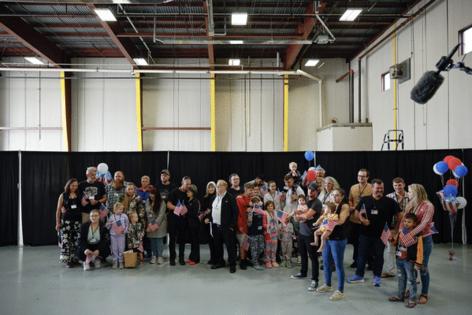South Africa's Ramaphosa pans Trump's Afrikaner refugee program
Published in News & Features
WASHINGTON — Dozens of White Afrikaners arrived in the U.S. from South Africa on Monday, the first beneficiaries of a controversial resettlement program that was instigated by President Donald Trump, who is meeting with South African leaders next week.
The group, which includes families and their children, landed Monday afternoon at Washington Dulles International Airport and was greeted by U.S. officials. Deputy Secretary of State Christopher Landau said the Afrikaners had suffered from “unjust racial discrimination.”
“The South African government has not done what we feel is appropriate to guarantee the rights of these citizens to live in peace with their fellow South Africans,” Landau said.
Tensions between Washington and Pretoria have run high since Trump accused the South African authorities of seizing land from White Afrikaners and offered to resettle them as refugees in the U.S. Elon Musk, the president’s Pretoria-born billionaire backer, has spread a conspiracy theory that there is a “genocide” of White people in the country — a sentiment that Trump echoed on Monday.
The push to help White Afrikaners also comes against the Trump administration’s push to halt nearly all other refugee resettlement, while migrants at the southern U.S. border are generally barred from applying for asylum.
Trump said he understood that South African leaders will come and see him next week, while doubling down on his criticism and his insistence that American officials won’t attend upcoming G-20 meetings hosted by President Cyril Ramaphosa unless the farmers’ plight is addressed.
“It’s a genocide that’s taking place that you people don’t want to write about,” Trump told reporters in Washington on Monday. “And farmers are being killed. They happen to be White, but whether they’re White or Black makes no difference to me, but White farmers are being brutally killed and their land is being confiscated in South Africa.”
There have been no official land seizures in South Africa since apartheid ended in 1994, while police statistics show young Black men bear the brunt of violent crime. About 7% of South Africa’s 63 million people are White, and 11% of the population speak Afrikaans as their home language.
“It is baffling as to why the Trump Administration is admitting Afrikaners for resettlement while continuing an indefinite suspension for thousands of legitimate asylum seekers who have fled persecution, often because their lives were at risk,” Senator Jeanne Shaheen, the top Democrat on the Senate Foreign Relations Committee, said in a statement. “Last year, the UN found no South Africans were eligible for refugee status.”
Ramaphosa, who’s been trying to mend relations with South Africa’s second-biggest trading partner, said he told Trump in a recent conversation that the U.S. had been misinformed about a “fringe group” of Afrikaners who wanted to leave — and that they didn’t fit the description of refugees.
“Those people who have fled are not being persecuted. They are not being hounded, they are not being treated badly and they are leaving ostensibly because they don’t want to embrace the changes that are taking place in our country in accordance with our constitution,” Ramaphosa told a panel discussion in Ivory Coast on Monday. “We think that the American government has got the wrong end of the stick here, but we’ll continue talking to them.”
Other points of contention between the U.S. and South Africa include Pretoria’s decision to file a case in the International Court of Justice accusing Israel, a top American ally, of committing a genocide against Palestinians in the Gaza Strip, and Pretoria’s close ties with Iran.
AfriForum, a conservative White Afrikaans rights group, described the departure of the first “refugees” to the U.S. as a serious indictment against South Africa’s government, which it said has refused to condemn calls for violence against Afrikaners, adopted racially discriminatory legislation and condoned land seizures.
“AfriForum and our allies will also intensify our efforts to use every possible mechanism at our disposal, including international pressure, to bring about a change of direction in the country for the benefit of all, including Afrikaners,” Kallie Kriel, the group’s chief executive officer, said in a statement.
Ramaphosa signed off on legislation late last year that will make it easier for the government to take land without paying for it in the public interest to help ensure equitable access to land. His administration hasn’t expropriated any property so far, although millions of people have taken occupation of private and government property — official data show that about 12% of households are situated in informal settlements.
And in 2023, the president assented to a law that will enable the labor minister to compel companies to meet targets to ensure that workplace demographics reflect the national and regional economically active population.
The Democratic Alliance, the country’s second-biggest party and a member of the ruling alliance, has challenged both laws in court, arguing that they are discriminatory and are constitutionally invalid.
_____
(With assistance from Justin Sink, Ana Monteiro, S'thembile Cele and Rene Vollgraaff.)
_____
©2025 Bloomberg L.P. Visit bloomberg.com. Distributed by Tribune Content Agency, LLC.







Comments